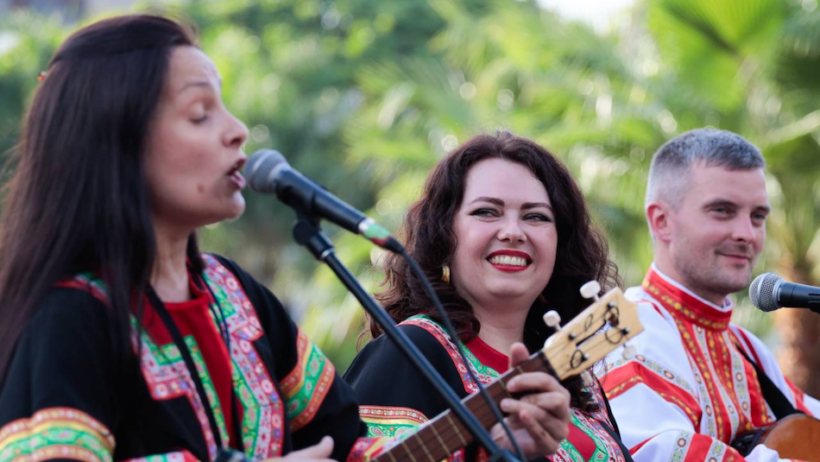Grenada, founded in 1973, first came across the stringed instrument by chance.
The purchase of a cuatro in Russia was the beginning of a journey that led Grenada to the knowledge and use of this stringed instrument, a symbol of Venezuelan culture.
During one of the group’s rehearsals in Moscow, its director, Tatiana Vladímirskaya, told RT the curious story of how they first got their hands on the instrument, which was declared Venezuela’s cultural heritage in 2013.
Vladímirskaya confidently claims that Grenada is the first Russian group to learn to play the Venezuelan cuatro.
Founded in 1973, the ensemble initially had a reduced line-up of two guitars, a “perfect soloist” and a pianist, Victor Gorokhov, who is still with the group today.
A profitable purchase
The Doctor of History recalls that when her friends from Tribuna Popular, the newspaper of the Communist Party of Venezuela (PCV), left Moscow, they wanted to sell the cuatro they had taken with them more than 11,000 kilometers away as a “souvenir of their homeland”, she explains.
“We decided to buy this cuatro and our boys started playing it. We knew about the instrument, we read a lot, but we did not have it in our repertoire, and we started to see examples of how to play and sing with it in Venezuela,” she says.
Vladímirskaya, who has won awards in countries including Chile, Cuba, and Venezuela, speaks of her husband Sergey Vladímirski, who died in 2006. She describes him as an “exceptional musician” who joined Grenada a few years after it was founded.
Grupo Grenada in Caracas, Venezuela, in May 2024.Javier Campos/Festival Viva Venezuela
“He also had this cuatro and he knew Venezuelan rhythms because he could understand them by listening and looking. He could solve the ‘secret’ of the rhythms,” he says. He has a collection of 860 musical instruments, which he keeps in his house.
“The heart of Chávez
In 2009, when the late Venezuelan President Hugo Chávez made his eighth visit to Russia, he met the Grenada group at the Peoples’ Friendship University in Moscow. On that occasion, after hearing the dexterity with which they played the instrument, he invited them to Venezuela.
“The cuatro opened the doors to the heart of Comandante Chávez. It was unforeseen, a gift from God, that’s how you have to explain it,” he says.
When they met the then-Venezuelan president, they spoke to him. On subsequent visits to the Russian capital, they held meetings at universities and other venues.
Chávez managed to open cuatro courses taught by Venezuelan musicians at the Moscow Conservatory. Several members of Grenada took advantage of this opportunity to improve their playing.
Russian-style cuatro
Vladímirskaya recalls the time when the Colombian musician Francisco Zumaqué was due to perform in the Eurasian country, and the Colombian and Venezuelan embassies went looking for a cuatro player. They did not find one among the Latin Americans, so they surprisingly found a Russian: Aleksei Zubrev, a member of the group Grenada.
Zumaqué had to play with a local orchestra that, although made up of experienced musicians, found it difficult to play Latin American music. The bandleader recalls trying to explain to the Colombian composer and arranger how complex Latin American rhythms were for Russians.
Alongside Zubrev, Russian women also play a leading role in the Venezuelan strings. Marina Polevaia and Anastasia Karaseva, both from Grenada, play the instrument and sing songs from the South American country and other corners of Latin America.
Performance in Venezuela
A few days after the meeting with the director of the ensemble, Grenada arrived in Caracas to take part in the Viva Venezuela festival, which took place between 10 and 19 May. This was their third visit.
The ensemble, which was awarded the First Class Orden Generalísimo Francisco de Miranda during the Chávez government, performed in the Plaza de los Museos and Plaza Los Símbolos (both in Caracas) and Guarenas (Miranda). He also gave a masterclass on Russian folklore at the University of the Arts (Unearte), also in the Venezuelan capital.
On this occasion, some of his members were in the South American country, including Olga Shapúrova, Olga Avérina, Viktor Makárov, Ksenilia Viktor, Alfiya Ravilova, Ekaterina Zubreva and Irina Obukhova.
During their recitals in public spaces, they performed traditional Russian songs accompanied by dances; some songs from the Latin American repertoire and, of course, they removed it to sing ‘Barlovento’ by Venezuelan composer Eduardo Serrano, ‘Viva Venezuela’ by Militiano Díaz, among others.
Russian folklore masterclass by the Grenada Group in Caracas, Venezuela, May 2024.AVN
The audience, fully integrated into the show whether they were singing in Russian or Spanish, ended up on stage dancing with the group to the famous ‘Kalinka’.






